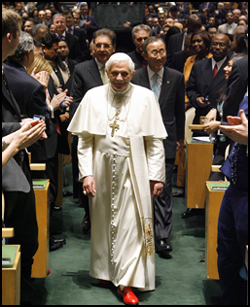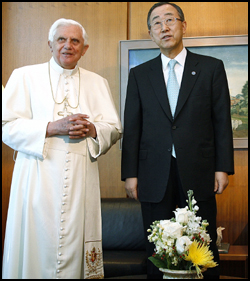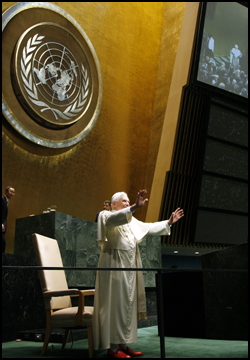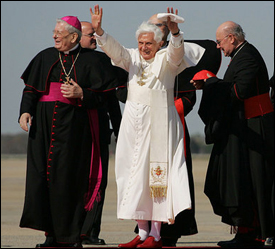BOB ABERNETHY, anchor: Coming up a live special report: Pope Benedict XVI addresses the United Nations General Assembly in New York.
Welcome. I’m Bob Abernethy of RELIGION & ETHICS NEWSWEEKLY, and this is a special, live report on Pope Benedict XVI’s address to the United Nations in New York. This is Benedict’s first trip to the U.S. since being elected pope and his first address to the UN. He’s expected to speak for about 25 minutes. He’ll read the first part in French with an English translation and then switch to English. We go now to the U.N. and to His Holiness Pope Benedict XVI.
POPE BENEDICT XVI (addresses United Nations General Assembly in prepared speech: available online here.)
 ABERNETHY: Pope Benedict XVI addressing the United Nations in New York, offering his greetings to the 192 members in the six official languages of the UN, saying, “Peace and prosperity with God’s help.”
ABERNETHY: Pope Benedict XVI addressing the United Nations in New York, offering his greetings to the 192 members in the six official languages of the UN, saying, “Peace and prosperity with God’s help.”
It was a very philosophical message that the pope gave, urging world leaders to emphasize and respect the fundamental religious and moral principles underlying the global issues and choices that the UN faces.
I’m Bob Abernethy of RELIGION & ETHICS NEWSWEEKLY. With me to discuss the pope’s speech is Kim Lawton, managing editor of RELIGION & ETHICS NEWSWEEKLY, who has been covering the pope since his arrival in Washington last Tuesday (April 15)
KIM LAWTON (Managing Editor, RELIGION & ETHICS NEWSWEEKLY): Well, you really saw the professorial side of this pope for this speech. It’s something he does a lot: He stresses sort of the fundamentals, the foundations, and rather than going through a whole laundry list of specific global issues, this speech really talked about the foundations that these issues flow from, from this pope’s perspective. So he talked a lot about human rights and within that this inherent human dignity — the fact that all people, no matter where you live or no matter what your economic status might be, everyone has an inherent human dignity. And that, of course, flows, from his perspective, from God, from being created in the image of God, from his perspective. But how he phrases it to the UN is this is natural law, something that all people have.
ABERNETHY: And he spoke of the human person and how that concept of the human person underlies even human rights.
LAWTON: Right, again this notion of human dignity. It was interesting in the speech — he began the speech in French, and it was during the French portion that he did speak about a few fundamental issues, specific issues, such as the environment. He mentioned a couple times the importance of the environment. He also talked about poverty and developmental issues. But he didn’t talk a lot about — he talked about terrorism and security, but he didn’t mention Iraq at all, which sort of interested me. He talked a lot about the importance of the world community working together and finding ways of cooperating together. There was a strong support for the UN. This pope has been very supportive of the United Nations, and he expressed that and raised concerns about small numbers of nations making decisions that affect the globe on their own. No specific countries were mentioned, no specific situations were mentioned. But, again, his support for a “global solidarity” is what he calls it, again, coming out of a cooperation and dignity for everybody.
ABERNETHY: And this speech, this speech today at the UN, his first as pope, following two other popes who as popes have addressed the UN, this follows a very busy and well-received several days in Washington. And you’ve been covering the pope, since he arrived last Tuesday (April 15). Maybe you’d take us through a little bit.
LAWTON: Well, first I just wanted to point out, if I might, one more issue from the speech before we talk about that. Within the human rights he did spend a lot of time talking about religious freedom, which is a very important concern for this pope, and what he said was religious freedom doesn’t just mean the exercise of religion, but it also means allowing religion to have an impact on the society around it. These were themes that he did also sound earlier in the week here in Washington as well. But that’s been an issue for him especially in relationships with the Islamic world. He’s pleaded for what he calls reciprocity, meaning that countries — if Muslims are allowed to have mosques in Christian nations, then Christians should be allowed to have churches in Muslim nations. And he’s also recently made some high profile statements about the right of conversion — that religious freedom includes the right to change one’s religion. Now this is a controversial concept in the Islamic world, and in some countries it’s against the law to convert to another faith. Just before Easter, this pope baptized a very prominent Italian Muslim at a ceremony in St. Peter’s Basilica. A lot of Muslims saw that as kind of a provocative act. But that was this pope saying religious freedom involves more than just exercising your religion in the privacy of your own home. He talked a lot about, earlier this week as well during his trip to Washington, this notion of having faith have an impact in the public square. He really praised American Catholics for being involved in American society, and many times, on many fronts he praised the vitality of the U.S. church and said that American Catholics really need to guard against letting what he called increasing secularism of the culture squelch that. He wants to see faith have an impact.
ABERNETHY: And we’re looking at some of these wonderful pictures of Benedict XVI in Washington as he arrived and visited the White House with President Bush. And also, along the line of what you were saying about the importance of interfaith dialogue, he did meet with, in Washington, with representatives of other religions.
LAWTON: Yes. He met with other faith leaders. It was a brief meeting and very symbolic, although several of those religious leaders told me symbolism is important. It shows that this pope does want to reach out. But I think he wants to reach out on his own terms. And, you know, it’s not just like aren’t we all just warm and fuzzy, but there are real issues to be discussed, and that’s part of what he says. You know, at that meeting at the White House he did talk with the president about Iraq there. We know that this pope was against the invasion of Iraq, the U.S. invasion. But the White House says that they stressed more the humanitarian situation inside Iraq, and it’s this pope’s concern about the many refugees from the violence.
ABERNETHY: And he was very well-received in Washington, on the streets and everywhere he went.
LAWTON: It’s interesting, because a lot of Americans feel like they don’t really know this pope. Certainly John Paul II was this enormously popular figure, very charismatic, and people have been a little less sure about this pope. So I think it’s been interesting for people to see him, get a closer view of him, and they’ve been lining the streets to meet him.
ABERNETHY: And he did something that many, many, many Catholics and others have very much wanted him to do. He met with victims of the sex abuse scandal.
LAWTON: He did. That was a big question before the trip — to what extent would the pope address the clergy sex abuse crisis, which is still a major concern for the church here. It’s had a huge and lingering impact. In fact, before he came there was some pressure put on him to actually go to Boston, which was the epicenter of the sex abuse crisis. In the end, the Vatican chose not to do that, but the pope has been raising this issue repeatedly. I think a lot of people were surprised. They expected maybe one mention. He’s referred to it repeatedly, and in fact he did meet privately with a group of victims. We think this is the first time a pope has ever –
ABERNETHY: — from Boston.
LAWTON: From Boston. Indeed, from Boston. Now it’s interesting that in none of those victims were some of the key activist leaders that have been really pushing the church to do a better job of this, and some of those victims’ advocacy groups say that they were pleased about this but it’s just a small first step, and they still want to see more discipline for church officials that covered up the crisis and that enabled some of these priests to continue. So — but a lot of people were genuinely pleases that this pope took so much time to meet, in a very busy schedule, to make time for this and to put this really front and center of his visit.
ABERNETHY: And to speak about — he said at one point words failed him. He couldn’t express the shame.
LAWTON: He said he was ashamed and he also pledged that the church would do what it can to keep pedophile priests out of the priesthood.
ABERNETHY: We’re seeing scenes now from the Mass now at Nationals Stadium in Washington, well attended. Probably could have packed two or three times as many who wanted to get there as were able to get in.
LAWTON: Well, those tickets were really hot commodities around town, and the church was very concerned about possible scalping of the tickets. It was very crowded. But I think it was one of those moments people got to see this pope. It was very well scripted. A lot of things surrounding this pope are very well scripted. But there were a few human moments as well that touched people. On his way out of the Mass he actually stopped and kissed a baby, like a good politician in Washington might and that had the crowd on their feet yelling. During his homily as well at Nationals Stadium he also encouraged Catholics again to enact their faith in the public square. That’s been a common theme, and then one that we heard even today at the UN — that religion has a role to play in the public, that religious groups have a contribution to make to society on the national level, bringing their values to society, and as we heard today at the UN, on the international level. He said that religious communities were standing by to help foster dialogue and prevent violence. And certainly in these times when religion is so tied to a lot of the violence, he’s offering his community as a possible solution. And that’s been a big theme for his papacy.
ABERNETHY: One of the things in Washington, as you pointed out, this pope has not been well known here in polls leading up to this visit. A lot of people said they really didn’t know him very well. There was the pageantry and the messages, true. But I think it was that gesture, that gesture with the victims of the sex abuse crisis that probably moved people favorably in their opinion of this pope, as much at least than any other thing he did.
LAWTON: Well, certainly I think that was a very important moment in this visit, and I do think it was part of a humanizing of this pope in a lot of ways. He had this image of this Germanic, maybe kind of cold and aloof, and he is very well scripted – again, I think part of that professorial part of him. But there was a warmth and humanity.
ABERNETHY: But his manner is not the manner of a lecturer or the preacher. It’s a very quiet manner of one of almost talking to a small group.
LAWTON: Well, he’s used to speaking to, you know, as a lecturer in a classroom setting, I think. People say that he is rather shy personally, and John Paul II, meanwhile, was an actor and so more comfortable on a public stage. But this pope has a very pastoral concern, and again, his emphasis is on the basics, on the foundations — the foundations of faith and the foundations of philosophy, as we heard today at the UN speech, that underpin the issues that he’s most concerned about, and I think that’s what’s been coming through.
ABERNETHY: Yes, and probably his speeches, especially this one at the UN, probably will be the basis for a very great amount of study when one can read them and think about what he was saying.
LAWTON: Well, that’s what people say. All of his speeches need a lot of study, a lot of, really, dissecting. But meanwhile the spin doctors are going to be taking a look and moving it in their direction, every which way.
ABERNETHY: Just like the [presidential] campaign. Kim Lawton, many thanks. This has been a special report from RELIGION & ETHICS NEWSWEEKLY on Pope Benedict XVI’s address to the United Nations.
Click here for much more on the pope’s visit to the U.S.








 ABERNETHY: Pope Benedict XVI addressing the United Nations in New York, offering his greetings to the 192 members in the six official languages of the UN, saying, “Peace and prosperity with God’s help.”
ABERNETHY: Pope Benedict XVI addressing the United Nations in New York, offering his greetings to the 192 members in the six official languages of the UN, saying, “Peace and prosperity with God’s help.”
